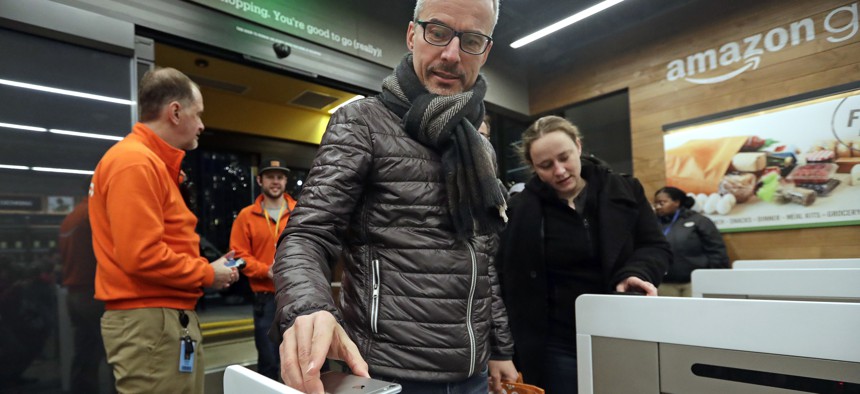Don’t Be Afraid of a Cashless Future

A customer scans his phone app at the entrance to an Amazon Go store in Seattle. AP Photo/Elaine Thompson
COMMENTARY | City ordinances requiring businesses to accept cash payments to protect the poor are missing the larger picture.
This spring, Philadelphia became the first U.S. city to require retailers and restaurants to accept cash payments. Proponents of the law say it will ensure people without credit cards or phones have access to food and services. Certainly, looking out for our least fortunate residents is admirable and well intentioned. But there are ways to have a positive impact on communities without stifling innovations.
Requiring businesses to take cash to protect poor people superficially makes sense. Existing law already requires certain places to accept various forms of government assistance. However, most airlines, Amazon Go convenience stores and newer fast casual chain restaurants like Tender Greens do not accept cash. And many other food chains, including some Starbucks stores and Dig Inn, Dos Toros and Argo Tea locations, don’t take cash, according to the New York Times.
And cash is nonsensical for sellers of luxury products. Should jewelers, piano sellers and art galleries be required to take cash? But simply exempting those with expensive or luxury items wouldn’t make this Luddite law better.
There are good reasons why policymakers should not require a retailer or restaurant to accept cash. For one, banning cash prevents money laundering and it helps ensure fair tax collection. This is a big point for government. Some bad actors who run cash businesses keep two sets of books – one that is accurate and one that pays taxes.
After selling a successful business, my brother became a business broker to see what else he could buy. After a year looking at scores of small cash retail businesses, he concluded that almost all had deceived the IRS. He gave up and invested a year of his life working for free to learn every job in a McDonald's restaurant to qualify to buy a franchise, which he succeeded at doing.
This is a law choking innovation.
Businesses have great reasons for moving away from cash transactions. Not having to deal with cash saves time, cuts costs, reduces theft, eliminates armed robberies for cash and mitigates disease transmission from handling cash. It also reduces the need to buy expensive cash registers and hire and train cashiers. These costs are often a barrier to entry for new retail businesses. A cashless environment allows easy record keeping and reduces fraud. From a customer standpoint, it moves lines quicker. More than once, I have waited in line with frustration as the person in front of me fumbled to find coins to pay.
Several American innovators have developed great cashless systems empowering entrepreneurs and easing transactions between everyday Americans. Amazon, PayPal, Google Pay, Zelle (which I highlight in my new book Ninja Future), Square and others have eased our lives and should be encouraged.
Furthermore, barring cashless retail and restaurants puts us behind our national competitors. We already trail Europe and China in cashless payments, especially mobile phone transactions. While some urban restaurants and stores in Europe and Asia do take cash, many Europeans and Chinese walk around without cash since most urban retailers and restaurants almost exclusively receive electronic payments by phone or credit cards.
Meanwhile, in the U.S., Massachusetts has a 1978 law requiring retailers to accept cash, and a few jurisdictions are considering proposals similar to the Philadelphia law. In fact, San Francisco's Board of Supervisors voted to ban cashless stores across the city earlier last week. The New Jersey legislature passed a bill in February banning cashless retailers and imposing up to a $5,000 fine for a second offense. It exempts certain parking garages, airport retailers and car rental companies. The governor signed the bill into law earlier this year.
The Philadelphia law sets a bad precedent, one that threatens the state’s ability to attract the creation of new, innovative businesses. The Consumer Technology Association produces the Innovation Scorecard, which ranks states by how innovation friendly they are. Historically, Pennsylvania ranks high; last year they were 12th. Mandating Philadelphia’s stores to stay stuck in the past is a move that is inconsistent with the commonwealth’s otherwise shining record.
Cash is not totally going away anytime soon; plenty of retailers and food stores will accept it for many years. But the marketplace—not government—should keep cash alive. After all, many government benefits are being paid now via credit card.
Gary Shapiro is president and CEO of the Consumer Technology Association.
NEXT STORY: DARPA vs. the mosquito






